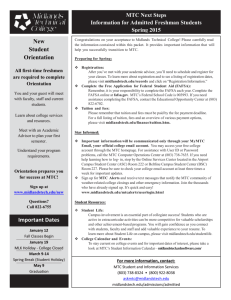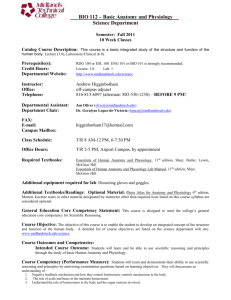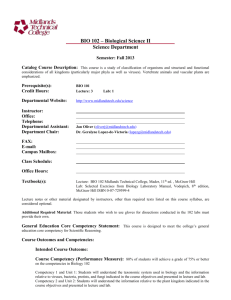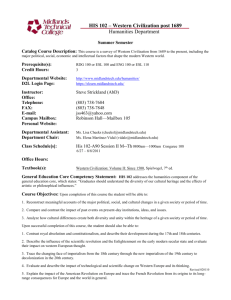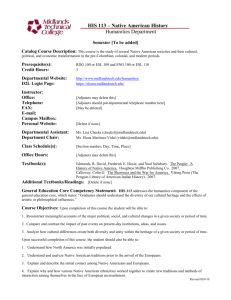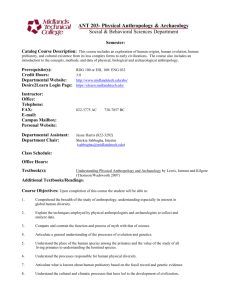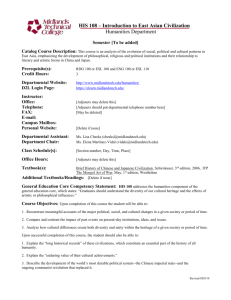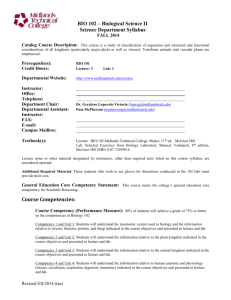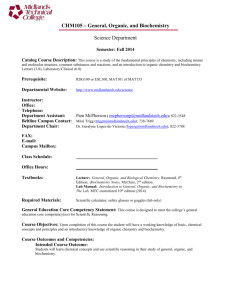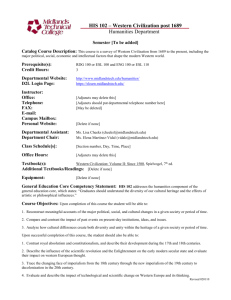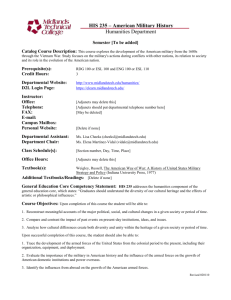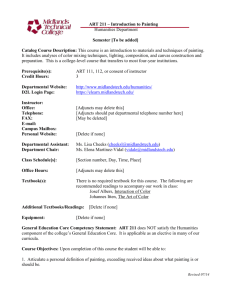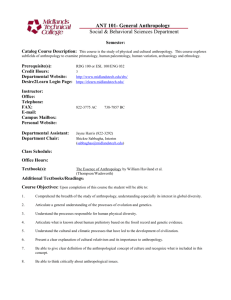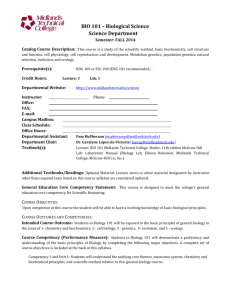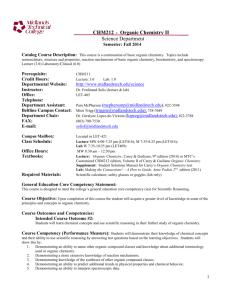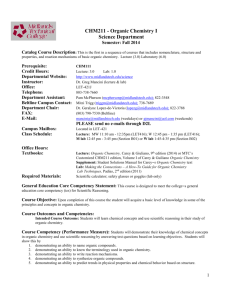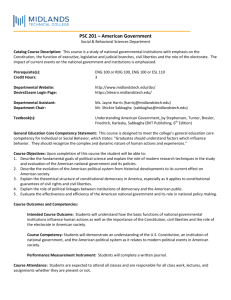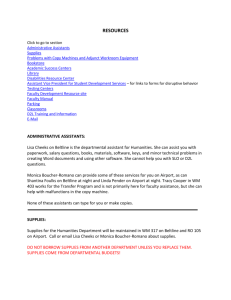BIO 205 Syllabus On Campus
advertisement
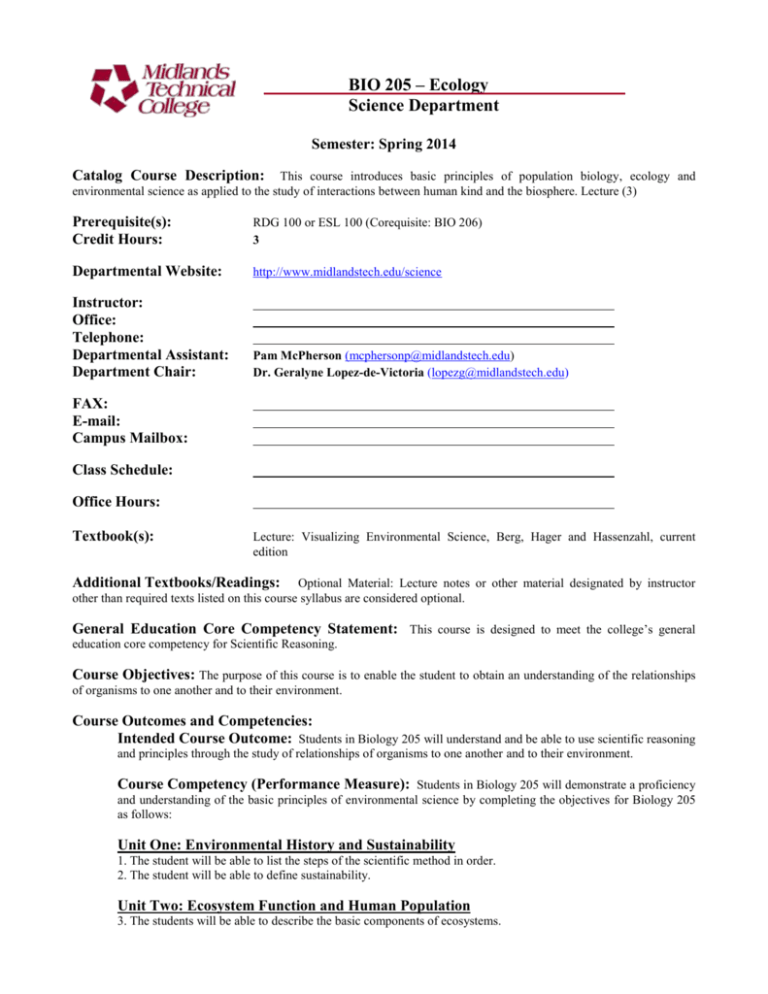
BIO 205 – Ecology Science Department Semester: Spring 2014 Catalog Course Description: This course introduces basic principles of population biology, ecology and environmental science as applied to the study of interactions between human kind and the biosphere. Lecture (3) Prerequisite(s): Credit Hours: RDG 100 or ESL 100 (Corequisite: BIO 206) 3 Departmental Website: http://www.midlandstech.edu/science Instructor: Office: Telephone: Departmental Assistant: Department Chair: Pam McPherson (mcphersonp@midlandstech.edu) Dr. Geralyne Lopez-de-Victoria (lopezg@midlandstech.edu) FAX: E-mail: Campus Mailbox: Class Schedule: Office Hours: Textbook(s): Lecture: Visualizing Environmental Science, Berg, Hager and Hassenzahl, current edition Additional Textbooks/Readings: Optional Material: Lecture notes or other material designated by instructor other than required texts listed on this course syllabus are considered optional. General Education Core Competency Statement: This course is designed to meet the college’s general education core competency for Scientific Reasoning. Course Objectives: The purpose of this course is to enable the student to obtain an understanding of the relationships of organisms to one another and to their environment. Course Outcomes and Competencies: Intended Course Outcome: Students in Biology 205 will understand and be able to use scientific reasoning and principles through the study of relationships of organisms to one another and to their environment. Course Competency (Performance Measure): Students in Biology 205 will demonstrate a proficiency and understanding of the basic principles of environmental science by completing the objectives for Biology 205 as follows: Unit One: Environmental History and Sustainability 1. The student will be able to list the steps of the scientific method in order. 2. The student will be able to define sustainability. Unit Two: Ecosystem Function and Human Population 3. The students will be able to describe the basic components of ecosystems. 4. The student will be able to list the factors contributing to human population growth. Unit Three: Air and Water Resources 5. The student will know the causes of the major atmospheric changes produced by man. 6. The student will be able to define the stages of the water cycle. 7. The student will be able to identify sources of water pollution. Unit Four: Land and Biological Resources 8. The student will be able to name the components of the soil ecosystem. 9. The student will be able to list the various values of biodiversity. Unit Five: Waste and Energy 10. The student will be able to define municipal solid waste and list the reasons for why the amount is increasing. 11. The student will be able to list the advantages and disadvantages associated with renewable energy. 12. The student will be able to list the advantages and disadvantages associated with non renewable energy. Measurement Instrument: Students in Biology 205 will successfully complete the course objectives by achieving a final grade of 70% based on lecture examination questions. Course Attendance: Students will be allowed to miss twice the number of times a lecture or laboratory section meets If the lecture meets 3 times per week, 6 absences are allowed. If the lecture meets 2 times per week, 4 absences are allowed. If the laboratory meets once a week, 2 absences are allowed. If the student misses more than 10 minutes of class by either arriving late or leaving early, then the student will be counted as absent, missing fewer than 10 minutes is a tardy. Three tardies count as one absence. Students adding courses after classes begin are responsible for work covered from the first day of class. All classes missed count as absences. Please note the following: You are responsible for all material and announcements presented, whether you are present or absent. Withdrawal: Students may withdraw from a course anytime before the last week of classes (see the current semester college calendar, available on the MTC web site, for official dates). Students who wish to withdraw from a course must submit a withdrawal form to records. The date of withdrawal may affect a number of things, including financial aid/ tuition reimbursement, tuition refunds, and course grades. The effective date of withdrawal depends upon the date the withdrawal form is submitted to records. It is the student’s responsibility to be aware of relevant dates, to make an informed decision, and if necessary, to submit withdrawal forms in a timely fashion. For questions regarding the effect of withdrawal on financial aid or tuition reimbursement students should contact Student Financial Services. Deadlines for tuition refunds may be found on the current semester college calendar, available on the MTC web site, or by calling the cashier’s office. Students who withdraw before midterm will receive a grade of W. Students who withdraw after midterm and have an overall class average of 60% or greater will receive a grade of W. Students who withdraw after midterm and have an overall class average below 60% will receive a grade of WF, which is calculated as an F. Grades of W or WF are also assigned when a student exceeds the maximum number of absences allowed in a course. These grades are entered on the final grade roster along with the last date of attendance (LDA). Students should understand that the LDA does not constitute an effective date of withdrawal and should not consider a decision to stop attending class to be equivalent to withdrawal. Course Grading Scale: The final grade for this course will be determined as follows: A (90-100) B (80-89) C (70-79) D (60-69) F (<60) Lecture exams- 100% 2 Spring 2014 BIO 205 A grade of zero will be recorded for any announced exam (or assignment), which is missed. Instructor will indicate whether one lecture exam can be made up or whether the cumulative final exam will count twice in place of the missed exam. PLEASE NOTE: Should change become necessary, the instructor reserves the right to adjust the requirements, pace, or scheduling of this course. Any change will be announced in class before it becomes effective. The Science Department Chair, Coordinators, and faculty are here to help you. If you are having any problems in your classes, please contact the person who can help you. If we don’t know you are having problems, we can’t help you. Gerry Lopez is Department Chair and can be reached at 822-3443; Greg Mancini is Beltline Science Coordinator and can be reached at 738-7660. Contact Jan Oliver at 822-3548 for information regarding the Airport Science Coordinator. Course Field Trips: There will be no field trips for this lecture. Laboratory field trips will be listed in the Biology 206 syllabus. LABORATORY POLICIES AND SAFETY PRECAUTIONS The laboratory experience is designed to supplement and complement material covered in lecture, and is an integral part of the course. Material may be presented in greater detail in lab than in lecture. The laboratory experience may include dissections, films, demonstrations, experiments, workbook exercises, research and writing assignments, and field trips. The day, time, and location of approved field trips will be held during regularly scheduled lab times. Students will provide their own transportation. The laboratory instructors will give a sufficient amount of information and guidance to allow students to complete each lab, but success in lab primarily involves the individual effort of each student. To maximize learning and to minimize the risk of accidents or injury, the following policies and rules will be observed in science labs: 1. 2. 3. 4. 5. 6. 7. 8. 9. 10. 11. 12. Laboratory exercises must be completed during the assigned lab period unless otherwise designated by your instructor. Students should read laboratory exercises before coming to class. Do not disturb any equipment or demonstrations that have been set up, until your instructor has told you how to proceed with the assignment. Apply yourself in lab. The exercises are designed to reinforce and expand upon material presented in the lecture. Follow directions carefully. Do not hesitate to ask your lab instructor for clarification of any instructions you do not understand. However, do not expect your lab instructor to simply give you answers to information you should be obtaining through the completion of the various lab exercises. Bring all necessary materials to class, including your text. Do not bring any food or drinks 7.into any science lab. Know where the eyewash station and shower are located in each lab. Report injuries immediately to your lab instructor. Lab coats and protective eyewear are required in certain labs including microbiology and chemistry. At the end of each lab, leave your work space in good order by discarding waste materials, cleaning and disinfecting your lab table, returning all materials used to their proper place, and sliding your chair back under the table. No visitors are allowed in lab or lecture. 3 Spring 2014 BIO 205 TENTATIVE WEEKLY SCHEDULE BIO 205 WEEK 1 LECTURE TOPIC The Environmental Challenges We Face Environmental Sustainability Environmental History, Politics & Human Values Risk Analysis and Hazards EXAM I CHAPTER 1 2 3 4 1-4 How Ecosystems Work 5 Ecosystems and Evolution 6 Human Population Change 7 EXAM II 5-7 Air and Air Pollution 8 Global Atmospheric Changes Freshwater Resources and Water Pollution The Ocean and Fisheries Exam III Mineral and Soil Resources 9 10 11 8-11 12 Land Resources 13 9 Agriculture and Food Resources Biological Resources 14 15 10 EXAM IV 12-15 Solid and Hazardous Waste 16 Nonrenewable Energy Resources 17 Renewable Energy Resources 18 2 3 4 5 6 7 8 11 Final Exam TBA 4 Spring 2014 BIO 205 Academic Affairs Student Guidelines and Expectations MTC Student Handbook: Students are expected to read the MTC Student Handbook and abide by its policies. You can find the handbook online at http://www.midlandstech.edu/handbook/; copies are also available at various locations on campus. Some of the more important handbook policies that impact your academic success are listed below. Academic Integrity: The students of MTC have adopted the following Honor Code: As a member of the Midlands Technical College community, I will adhere to the college’s Student Code. I will act honorably, responsibly, and with academic integrity and honesty. I will be responsible for my own academic work and will neither give nor receive unauthorized or unacknowledged aid. I will behave courteously to all members of the MTC community and its guests and will respect college property and the property of others. The Student Code (Appendix I of the MTC Student Handbook) defines academic dishonesty, which includes, but is not limited to, cheating on tests, plagiarism, collusion, and falsification. Such actions will result in discipline. Cheating on tests includes: . Copying from another student’s paper. . Copying or presenting someone else’s work as your own. . Using unauthorized materials during a test. . Collaborating with any other person during a test without permission. . Knowingly obtaining, using, buying, or selling in whole or part the contents of any test. . Bribing any other person to obtain information about tests. . Substituting for another student, or permitting another student to substitute for you. Plagiarism is taking another person’s work and using it without giving the source credit in any graded assignment. The use of cell phones or other portable electronic devices for purposes of academic dishonesty in any form is strictly prohibited; students who violate this policy will be subject to the disciplinary procedures and sanctions outlined in the Student Code. For more information about academic dishonesty, see the Student Code. Class Attendance and Participation: Students are responsible for meeting all attendance and participation requirements outlined in each course syllabus. Portable Electronic Devices: Cell phones and other portable electronic devices may be used in classrooms only for maintaining access to MTC Alerts!, the college’s emergency notification system. Cell phones MUST be set to vibrate. Other uses of portable electronic devices (for example, leaving class to make or receive phone calls, sending or reading text messages, accessing the internet, taking pictures or videos, listening to music, etc.) will be considered disruptive activities, and the student will be subject to disciplinary action. Student Email Accounts (MyMTC Email): All MTC students are assigned a college email account called MyMTC Email. For access, follow the link on the Enrolled Students page or go to http://www.midlandstech.edu/myemail. MyMTC Email is the primary way the college communicates with students. You are responsible for checking your college email regularly for important information and announcements about registration, financial aid, cancelled classes, emergencies, etc. Students can use their college email accounts to communicate with faculty, staff, fellow students, and others, as well as to maintain personal calendars and task lists. In addition to using MyMTC Email, students may also be required to communicate with instructors through Desire 2 Learn (D2L, the college-wide learning management system), or through course-specific software, such as MyMathLab. 5 Spring 2014 BIO 205 MyMTC: The college conducts business with students through MyMTC, which provides many services and resources, including access to transcripts, grades, and program evaluations; information about financial aid status; and how to search and register for courses. To access MyMTC, follow the link on the Enrolled Students page or go to http://mymtc.midlandstech.edu. Children on Campus: Children are generally not permitted on campus except for special events. Children are not permitted in classes, labs, or advisors’ offices. Children can never be left unattended on campus, including in the library, the Academic Success Center, or parking lots. Inclement Weather Policy: If weather conditions or other emergencies cause the college to close or open late, announcements will be made over local radio and TV stations, on the MTC website, and on the college’s information line (803-738-8324). Notices will be sent to students via MyMTC Email and MTC Alerts! when applicable. Check for separate announcements for day and evening classes because weather conditions can change during the day. Inclement weather schedules: In standard non-lab and non-clinical classes, if the college closing or reopening means that there is at least 30 minutes of a class remaining, plan to attend that class. For example, if the college opens at 10 a.m., classes that normally meet at 8 a.m. will not meet, but classes that normally begin at 9:35 a.m. will begin at 10 a.m. Similarly, if the college closes at 8 p.m., 6 p.m. classes will meet for their regular time, but 7:35 p.m. classes will not meet. Check your syllabus for specific information about the inclement weather policy for that course. Campus Emergency Protocol: To report safety concerns or suspicious activities, call Campus Security at 7850 (on campus) or 738-7850 (cell phone or off campus). To report a security emergency, call Campus Security at 738-7199 or dial local 911 immediately. The college also provides emergency call boxes; look for these red call boxes in or near parking lots on all campuses. If a college-wide emergency occurs, the college will communicate additional information and instructions in a number of ways, including the MTC Information Centers, campus loud speakers, MyMTC Email, the MTC website, and MTC Alerts!. To sign up for MTC Alerts! and receive emergency notifications on your cell phone, go to: http://www.midlandstech.edu/Phone_Alert.htm. Student Evaluation of Instruction: Toward the end of the semester, students will be encouraged to participate in evaluating their courses. You can complete this confidential evaluation through MyMTC using your username and password. Announcements will be made during the term concerning how and when to complete the online evaluation. Students Requiring Special Accommodations: If a student with a disability requires special accommodations, the student should go to Counseling Services in the Student Center on Beltline or Airport Campus for assistance. Documentation regarding a specific disability is required in order for special arrangements to be made. All information received will remain confidential. For more information, follow the Disability Resource Centers link under Online Resources on the Enrolled Students page. The staff of Counseling and Career Services works to ensure that all educational programming and services are accessible to otherwise qualified students with disabilities. If you have a concern regarding the accessibility of websites, instructional materials, online courses and other electronic or information technology please contact Counseling and Career Services. It is the student's responsibility to self-disclose as a student with a disability and to request accommodations prior to beginning a program or course. Please contact the staff of Counseling and Career Services at 803-822-3505 (AC) or 803-738-7636 (BC) or via email at disability@midlandstech.edu if you have any questions or concerns. 6 Spring 2014 BIO 205 SCIENCE DEPARTMENT CODE OF CONDUCT Student rights and responsibilities are outlined in the MTC Student Handbook. http://www.midlandstech.edu/planner/ We are extremely proud of the quality of students in the Science Department; however, there have been occasions where disciplinary action is necessary to prevent disruptive and dishonest behavior. The following items are specific violations and consequences supported by the Science Department. Your instructor will circulate a form for your signature stating that you understand the Science Department Course Syllabus, which includes this document. Any student who exhibits behavior that is disruptive to the learning process such as talking, discourtesy to faculty or fellow students to include obscene language or gestures, or uncooperative actions will be asked to leave the classroom. The student will be counted absent for this class. Depending upon the nature of the offense or if it occurs during an exam the instructor may require that the student see the science coordinator, chair of the science department, or the Assistant Vice President for SDS before returning to class. Campus Security will be called for any threatening or violent behavior. Portable Electronic Devices: Beepers, cell phones, music players, other electronic devices, and similar devices are not permitted in class. Permission must be obtained from the science coordinator or instructor for students who are emergency personnel or where there are extenuating circumstances. Campus Security can locate a student and will interrupt a class if there is a situation that needs immediate attention. Refer to page 8. Any student proven to have engaged in academic dishonesty will be given a grade of zero on the exam or assignment. This includes, but is not limited to, giving or receiving information during an exam, use of unauthorized materials during an exam or assignment, plagiarism, or changing answers after a grade has been assigned. Any incident involving academic dishonesty will be reported to the Assistant Vice President for SDS. For more information, please refer to your MTC Student Handbook http://www.midlandstech.edu/planner/ 7 Spring 2014 BIO 205
